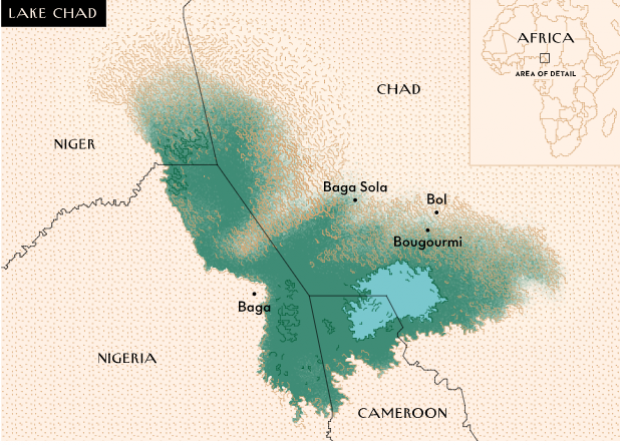“Until the 1960s, Lake Chad was the fourth largest lake in Africa and the sixth largest lake in the world: however, its surface area has since dwindled from 26,000 square kilometers (10,000 square miles) in 1963 to less than 1,500 square kilometers (150 square miles), or about 5% of its original area.” (Lakepedia)
There is a distinct possibility that Lake Chad might disappear altogether in just a couple of decades or less. Lake Chad must be saved. That was the general global consensus arrived at, at the world summit and reflected in the outcomes of the United Nations General Assembly resolution in 2015 that recognised the Lake’s “universal value”.
This consensus found expression in the numerous specialised and general studies and reports by the United Nations and other experts, outlining the critical importance of this body of fresh water and the impact its disappearance would have on the millions of inhabitants living in its vicinity across four countries. Saving Lake Chad is not only an existential matter for Nigeria but also a way of discharging an important obligation to the rest of the world.
The measure of one’s greatness is in the compass of one’s imagination. Nations become great and respectable by undertaking great and visionary projects. Egypt, Tanzania, Ethiopia, Morocco and other lesser-endowed African countries today are driven by the necessity to embark on mega projects that will change their fortunes and the assessment of their citizens in decades to come. China is in the vanguard of global mega projects construction that has left the rest of the world in awe and enthralled about the dizzying heights that the country can reach in its strides towards greatness.
A start has been made in Nigeria towards achieving greatness already, which needs to be extended to other parts of the country to aggregate opportunities and harness our unquantifiable resources.
Nigerians reacted variously to the decision to construct a West-East Highway from Lagos to Calabar, at an unprecedented cost of N13 trillion. The outlay for this so-called “Coastal Highway” project may seem initially astronomical. However, in the scheme of national renewal and development, such projects may also serve to trigger and magnify the national imagination and consciousness about what can be possible when political will and government’s determination are combined towards achieving a grand vision. The multiplier effects of such mega projects may not be immediately discernible, but time and usage might reveal the wisdom and soundness of their execution.
Similarly, a renewed commitment and determination towards the regeneration and reconstruction of the entire North-East of Nigeria is called for, to open up that vast territory and develop its riches and potentials for the benefit of the rest of the country and the region. This vision should primarily entail the recharging of Lake Chad to rescue it from its undeserved fate of disappearing from the face of the earth.
Several bodies of water have disappeared or are about to become extinct due to human factors and unavoidable climatic catastrophes. The disappearance of Lake Chad is a catastrophe that can be averted and indeed, be reversed, for the greater benefit of the region and Nigeria especially.
The North East’s full potential cannot be realised without the harnessing of the region’s ample water resources, especially in Adamawa, Gombe, Bauchi and Taraba states. Maximizing the availability of water resources and minimizing the effects or consequences of oversupply or absence of this element, such as during floods and droughts, have become critical considerations in addressing climate change and sudden and drastic changes in our environment.
The determination shown by the Tinubu-Kashim administration and its ministers like Dave Umahi and Nyesom Wike in undertaking vigorous infrastructure development should be replicated in other facets of national life that should prove overall beneficial to our collective wellbeing.
Likewise, the creation of the Ministry of Blue Economy which has received a wide acclamation, should seek to correct the deficiencies of the past and create opportunities for the future, in terms of ensuring the security and well-being of the nation in critical areas of the economy. The responsibilities of this ministry should be made to traverse three zones of the country namely the coastal, central and northern zones, to generate activities associated with the water resources of those areas.
A broader outlook towards the Atlantic coast, the Niger-Benue basin and the Lake Chad basin would create a holistic vision of developing the country’s marine resources and establishing a veritable blue economy for the nation.
This call is especially pertinent in the case of Lake Chad whose resuscitation has been an ongoing but albeit unsuccessful effort for the last five decades or so. Various attempts have been made in the past decades to fashion out a programme of recharging Lake Chad but to no avail.
Decades have been wasted and opportunities have been missed towards effectively creating a wonderful threshold of human ingenuity in this part of the world, that would dispel the ingrained habit of underachievement and the unmerited perception of indolence of our people. By embarking on a project of this magnitude by the Tinubu-Kashim administration, the idea that Nigerians can indeed rise to every challenge and overcome existential difficulties can be established for the edification and ennoblement of our people.
Plans and studies already exist towards diverting sufficient quantities of water from rivers within Nigeria to replenish Lake Chad. These studies should be backed up by factual assessments and up-to-date data collection using satellite imagery, drones and other latest technological facilities, to verify their assumptions and establish their premises so that the project of internal inter-basin transfers of water can successfully take place.
In undertaking a project like the Lagos-Calabar Highway with all its intricacies and physical challenges, a similar project of consequential importance should not elude our collective determination and willpower as a country. A group of local engineers, scientists and development experts has already created convincing scenarios for the transfer of water from the River Benue in Adamawa State to Lake Chad by building canals and other forms of transportation of water to the lake.
The several advantages of this proposal have been graphically demonstrated especially in areas such as additional power generation, tourism, agriculture and livestock, fisheries, creation of new human settlements and wildlife reserves, excess flood control, as well as enhancement of the environmental and climatic conditions of the area.
The questions of funding and technical details have all been diligently scoped and cost-benefit analyses have been prepared for the take-off of the project. It will be wise for the federal government through the agency of its ministries and other relevant establishments to engage the professionals who have drawn up the plans for inter-basin water transfer to initiate discussion and exchange notes on the feasibility of their visions.
The National Assembly can provide the necessary enabling legislative environment for the initiation of such a project by ordering environmental impact studies and other investigations into its viability and eventually making the necessary appropriations to fund it.

 Join Daily Trust WhatsApp Community For Quick Access To News and Happenings Around You.
Join Daily Trust WhatsApp Community For Quick Access To News and Happenings Around You.


